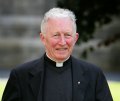An attempt to prosecute Bishop Philip Boyce of Raphoe (pictured) for incitement to hatred has been condemned  by a leading British secularist as an attack on free speech.
by a leading British secularist as an attack on free speech.
Gardai confirmed last week that they have prepared and forwarded a file to the DPP after former Fine Gael candidate, John Colgan, made allegations Dr Boyce was in breach of the Prohibition of Incitement to Hatred Act, 1989.
In a homily in Knock in August Bishop Boyce said the Church was being attacked by the arrows of a “godless culture”.
But Terry Sanderson, president of the British National Secular Society (NSS), said that the move by John Colgan, the former head of the Campaign to Separate Church and State was “utterly ridiculous”.
And he called on Mr Colgan to “withdraw his complaint immediately and grow a thicker skin”.
Mr Sanderson, who organised protests against the Pope’s visit to Britain in 2010, said he absolutely opposed the effort to prosecute the Bishop of Raphoe.
He said: “Free speech is worth nothing unless it is available to everyone, believer and non-believer alike.”
“Does Mr Colgan not see that his attempted prosecution of the Bishop is no different from the efforts of Islamists to silence their critics through the use of blasphemy laws or by charges of ‘Islamophobia’ and racism?”
Citing a number of cases in the UK where street preachers have been accused of homophobia for quoting the Bible, he said the NSS supported freedom of expression.
“The NSS has stood up for the right of street preachers to say what they want, even if someone is offended, just as long as there is no threat to the physical safety of those they are insulting.
“Differences of opinion should be settled by debate and rational exchange, not through violence or intimidation,” he said.
He suggested that if Mr Colgan didn’t like what Bishop Boyce had to say “he should argue with him, not seek his prosecution”.
He added: “Actually, there was nothing in what the Bishop said that could be regarded as even remotely inflammatory or an ‘incitement to hatred’. Inciting hatred that will lead to violence against people steps over the line, but criticising their opinions most definitely does not.
“If the Bishop thinks his pious approach to life is superior to that of atheists, then he should be entitled to say so. Equally, atheists should be able to argue back that the Bishop is deluded and ridiculous, if they want to.
“But if in the unlikely event that Mr Colgan’s complaint succeeds, the people of Ireland will have to think twice before engaging in vigorous debate on religious matters lest they, too, end up in the dock. This is utterly ridiculous.”
Mr Colgan’s complaint referred to two particular passages in Dr Boyce’s homily which he believes broke the law. One referred to the Catholic Church in Ireland being “attacked from outside by the arrows of a secular and godless culture”.
The second stated: “For the distinguishing mark of Christian believers is the fact they have a future; it is not that they know all the details that await them, but they know in general terms that their life will not end in emptiness.”
The Sunday Independent reported that Mr Colgan said: “I believe statements of this kind are an incitement to hatred of dissidents, outsiders, secularists, within the meaning of the [Incitement to Hatred] Act, who are perfectly good citizens within the meaning of the civil law.
“The statements exemplify the chronic antipathy towards secularists, humanists etc, which has manifested itself in the ostracising of otherwise perfectly good Irish citizens, who do not share the aims of the Vatican’s Irish Mission Church.”
When Mr Colgan wrote to the Bishop asking for an apology and retraction, Dr Boyce responded that it was not his intention to “disparage in any way the sincere efforts of those with no religious beliefs, atheists, humanists etc. I have too much respect for each human person, since I believe all are created in the image of God. At Knock I wished to encourage and confirm the hope of believers, even in the present challenging times, since trust in God was the theme I was given.”















